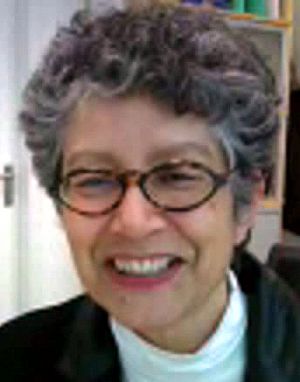Denise P. Barlow facts for kids
Quick facts for kids
Denise P. Barlow
|
|
|---|---|
 |
|
| Born | 31 January 1950 Yorkshire, England
|
| Died | 21 October 2017 (aged 67) Vienna, Austria
|
| Alma mater | University of Warwick |
| Awards | Erwin Schrödinger Prize (2014) Austrian Chapter Achievement Award-Medaille (2014) |
| Scientific career | |
| Fields | Molecular Genetics |
| Institutions |
|
Denise P. Barlow (born January 31, 1950 – died October 21, 2017) was a British scientist. She studied genetics, especially a field called epigenomics. This area looks at how genes are turned on or off without changing the DNA itself. Barlow was a member of the European Molecular Biology Organization (EMBO). She was also an honorary professor of genetics at the University of Vienna. She won the Erwin Schrödinger Prize from the Austrian Academy of Sciences. In 1991, she made a very important discovery. She found the first imprinted gene in mammals. This gene, called IGF2R, helps control how cells grow.
Contents
Biography
Early Life and Education
Denise Barlow was born in Yorkshire, UK, on January 31, 1950. When she was 16, she started a two-year course to prepare for nursing. At 18, she trained and worked as a registered nurse for four years. During this time, she decided she wanted to learn more about the human body. She wanted to study how diseases affect us. So, she went back to college to take more advanced classes.
At 25, Barlow began studying at the University of Reading. She earned a degree in Zoology with Physiology and Biochemistry. After graduating, she started her PhD studies at University of Warwick. She studied how viruses affect mouse embryos. She earned her PhD in 1981.
Important Research Work
After her PhD, Denise Barlow was invited to work in London. She joined the Imperial Cancer Research Fund Laboratories. There, she worked on finding genes that are active very early in an embryo's life. Later, she moved to Germany. She joined the European Molecular Biology Laboratory (EMBL) in Heidelberg. Her work there focused on finding mutated mouse genes.
In 1988, Barlow moved to Vienna, Austria. She became a group leader at the new Research Institute of Molecular Pathology (IMP). This was a very important time for her research. In 1991, she discovered the first imprinted gene in mice. This gene was named IGF2R.
After her time at IMP, Barlow worked at the Netherlands Cancer Institute in Amsterdam. Then, she continued her research in Salzburg, Austria. She worked at the Institute of Molecular Biology.
In 2003, Barlow became a founding member of the Research Center for Molecular Medicine of the Austrian Academy of Sciences (CeMM). She continued her work on epigenetics there. She was a principal investigator until she retired in 2015. In 2014, she received the Erwin Schrödinger Prize. This prize is worth 15,000 Euros. It is the most important award from the Austrian Academy of Sciences. Her last published work described a complete "allelome." This built on her earlier discoveries. These included the first imprinted gene and the first imprinted non-coding RNA.
Barlow became a member of the European Molecular Biology Organization (EMBO) in 1995. She also worked on the EMBO Science and Society Committee. She became the chairwoman of this committee in 2002. She strongly supported better chances for women scientists. She wanted to see more women in leadership roles at universities and research places.
Denise P. Barlow Award
The Denise P. Barlow Award for Best Thesis on Biological Mechanisms was created to honor her. Four research institutes in Vienna, where Denise Barlow worked, started this award. These institutes are the Research Institute of Molecular Pathology (IMP), the Max Perutz Labs (MFPL), the Institute of Molecular Biotechnology (IMBA), and the Research Center for Molecular Medicine (CeMM).
This award is given once a year. It celebrates new scientific talent. The prize is worth €5000. Winners also get a certificate with Denise P. Barlow's portrait. The award is for students who completed their PhD studies at one of these institutes. Their research must show new understanding of biological mechanisms. This means their work should be similar to Denise Barlow's own scientific interests.
The first winners of the award were chosen in 2019. They were Julia Batki and Matthias Muhar.
Honors and Awards
- Elected member of EMBO (1995)
- Honorary professor of genetics at the University of Vienna
- Erwin Schrödinger Prize of the Austrian Academy of Sciences (2014)
- EMBO/EMBL Austrian Chapter Achievement Award Medal (2014) for her lifetime achievements
See also
 In Spanish: Denise P. Barlow para niños
In Spanish: Denise P. Barlow para niños
 | Madam C. J. Walker |
 | Janet Emerson Bashen |
 | Annie Turnbo Malone |
 | Maggie L. Walker |

